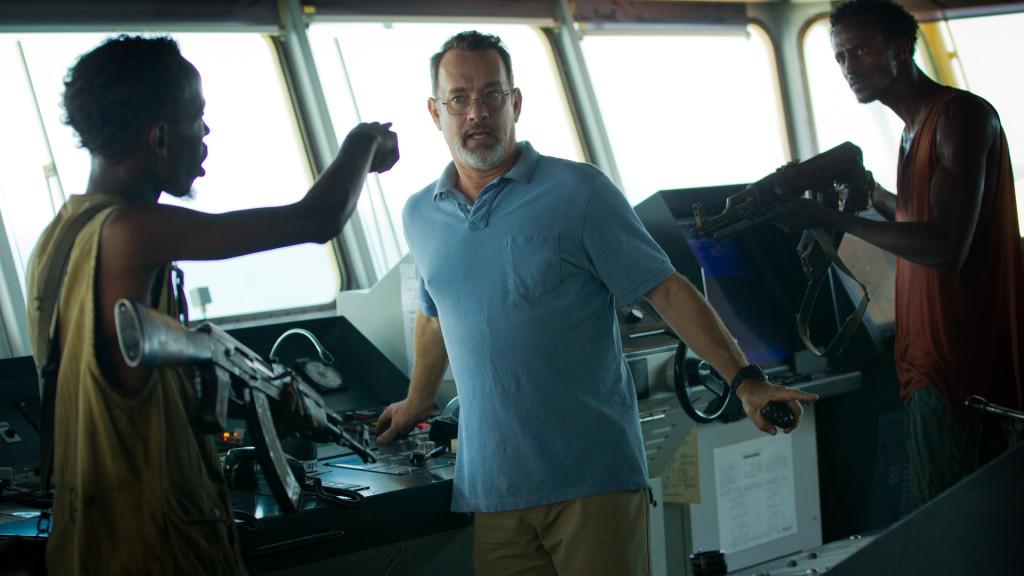“Captain Phillips” is Politically Charged, Kinetic Entertainment
October 25, 2013
Few filmmakers today have as singular an interest in contemporary political turmoil as Paul Greengrass, which makes his mainstream acceptance all the more remarkable. As the helmer behind the two most kinetic Bourne installments, Supremacy and Ultimatum, as well as the superb 9/11 docudrama United 93, Greengrass has proven tremendously influential in his intensely critical view of government and the shattering impact of large-scale dissent on the common American individual.
His new film, Captain Phillips, serves as perhaps his most successful synthesis of entertainment and political criticism. It uses the real-life incident of kidnapped cargo-ship captain Richard Phillips and translates it to the screen in a way that both preserves the sweaty, tense specifics of the incident while also ensuring the wider, deeper political theses are never lost on the audience.
Phillips’ 2009 imprisonment was well-documented in American media, but not to the extent that the filmmakers’ many creative liberties are terribly noticeable. While guiding a container ship to Mombasa, Phillips found his massive vessel seized by four Somali pirates. It is only when the pirates absconded in a lifeboat, with Phillips as hostage, that the American military took intense interest and began to slowly entrap the pirates.
Greengrass and screenwriter Billy Ray (The Hunger Games) cannily use Phillips’ ordeal as a springboard to explore and criticize American imperialist dominance. The film introduces Phillips and the pirates in identical contexts — skilled professionals undertaking the best possible job their surroundings have allowed them — and never allows us to forget their parallels. It is when the pirates are cartoonishly outmatched by our military force, however, that a genuine fury begins to emerge in Captain Phillips. As the four would-be villains continue their frenzied, desperate bargaining with our military, the ironic tragedy of their certain, jury-free execution grows ever clearer.
And how is this complex outrage shown on a human scale? One of the most famous faces in American entertainment, Tom Hanks himself.
Hanks, playing Phillips, is in absolute peak form. The unthinkably difficult development of his character, from steadfast captain into weeping, desperate prisoner makes for his most complex, emotionally bare turn in years. The four unknowns playing the pirates deserve the highest form of recognition as well, as they must both exude brute physical force and a growing sense of, if not exactly conscience, then recognition of their fate. Barkhad Abdi as their leader is exemplary.
It’s important to note that, in addition to the heft and emotional weight Phillips carries, it never betrays its identity as military-based blockbuster entertainment. This may be its downfall, in a way. There are not so much action sequences in Phillips as much as the film itself is one prolonged, escalating set-piece, and the direction is as surefooted, exciting and capable as we’ve come to expect from Mr. Greengrass. However, as the film’s third act approaches and the focus switches from Phillips and his captors to the military forces that seek to collide with them, the film gets too bogged down in its own self-contained, hyper-accurate military jargon. It creates a sense of authenticity, true, but at the expense of becoming a bit monotonous.
It’s no spoiler to say that at the end of the film, the captain is liberated from his captors and his captors robbed of their lives. Yet Captain Phillips wastes no time in patting its audience on the back or reassuring them that this ending is a happy one; one emerges from the film all-too-aware that while Phillips may be free, the socio-economic inequalities that forced his captors into their duties will remain totally unchanged. The song remains the same. And blood is on Phillips’ hands.











